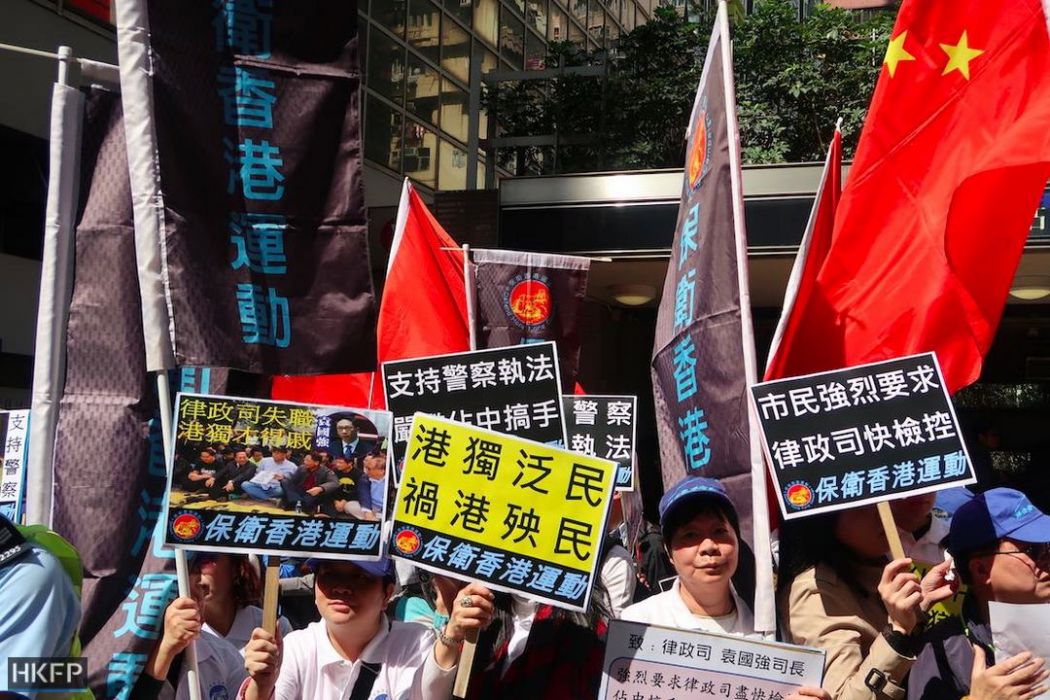Chinese state mouthpiece the People’s Daily has deemed the sentencing of seven police officers who assaulted Occupy activist Ken Tsang an “assault on rule of law in Hong Kong.”
“‘Occupy’ protesters commonly receive light sentences or impunity, yet the police officers who work hard to fulfill their duties and bear huge pressure receive heavy sentences due to a one-off mistake,” the paper said in its overseas edition on Tuesday.
The seven police officers were sentenced to two years in prison last week for assaulting activist Ken Tsang during the 2014 pro-democracy Occupy protests.

The article titled “Hong Kong expert: Judge heavily sentences police and lightly sentences Joshua Wong, harming Hong Kong’s rule of law” quoted Gu Minkang, a professor at the City University of Hong Kong, who told the paper that he was “very shocked” by the sentencing.
The paper cited Gu as saying that the sentences were too heavy, and the judge did not consider that they were up against a “vicious” suspect. He said they were besieged and insulted by protesters, and thus the beating was an impulsive action carried out under extreme rage. Under these circumstances, they should have been found guilty with a non-custodial sentence, he argued. When the sentence has met with so much opposition from society, he said, it is hard to say it is a just sentence.
3500 people attended a pro-police demonstration on Saturday, according to organisers, while police said there were 1,800 at its peak, according to Ming Pao. Meanwhile, over 8,300 people have signed a petition demanding Police Commissioner Stephen Lo Wai-chung apologise on behalf of the officers.
‘A vicious assault’
Judge David Dufton said in his sentencing that the case was very serious because the defendants were police officers who took Tsang to the substation to assault him while they were on duty. He took into account Tsang’s injuries, and the damage to Hong Kong’s reputation.
“I am satisfied a term of imprisonment is appropriate. Tsang was defenceless, his hands handcuffed behind his back with plastic ties. The assault was a vicious assault, in particular the first thirty seconds when Tsang was dumped on the ground, stabbed, stamped on and repeatedly kicked. Most fortunately Tsang did not suffer more serious injuries,” he said.

He reduced the sentence by six months to take into account the stress that police were under during the Occupy movement, their clear records, their dismissals and loss of pensions, and the stress caused while awaiting for the trial.
Pro-democracy lawmaker Lam Cheuk-ting said after the decision was announced that the two-year sentence was not lenient, and served as a warning to other law-enforcement officers.
The sentencing had a detrimental effect on Hong Kong’s rule of law, Gu argued, because those behind the Occupy protests had impunity, while the police were heavily sentenced, thus affecting the force’s ability to enforce the law.
‘Judge’s standpoint biased’
The article also accused the judge of having a biased stance. Gu used the example of the light sentencing for three activists who led protesters to occupy the forecourt of the government headquarters in an incident which helped spark the 2014 protests. The judge gave them light sentences because they had good intentions and were “expressing their demands,” Gu said.
Activist Joshua Wong was sentenced to a community service order of 80 hours, Nathan Law Kwun-chung was given 120-hour community service, whilst Chow Yong-kang received a three-week jail sentence with a one-year suspension.
“The judge responsible for this case David Dufton is a British person, and Hong Kong’s judicial system not only has many judges of foreign nationalities, but many were cultivated by the British Hong Kong government… but this kind of system clearly has room for discussion, which is that the issue of their standpoint may influence their judgements in cases,” the People’s Daily wrote.

Police supporters unsatisfied with the sentence also used anti-Western rhetoric against the British judge, with some saying that the law should be changed so that those with foreign passports cannot serve as judges in the city.
The article came after another from nationalistic mainland tabloid the Global Times on Monday. The paper’s commentator Shan Renping compared the sentence to biased refereeing at a football match.
The Department of Justice has warned the public against making comments which may exert pressure on individual judges.
“There is no place for scurrilous attacks against judges made in bad faith, or conduct which is calculated to bring the administration of justice into disrepute,” it told HKFP previously.
